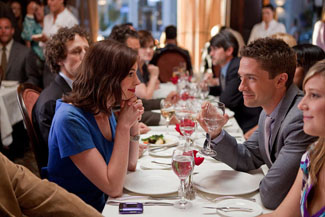Selling Out
By Tom Macy
February 22, 2010
BoxOfficeProphets.com

Regardless of what you chose to believe, the media made one thing clear. The time of $12.50 tickets (no joke, I'm in NYC) and $17 popcorn was at an end. If you think I'm exaggerating about the scale of this hysteria, google "2005 box office slump." The media was shouting doomsday so loudly it's a wonder Jerry Bruckheimer, Steven Spielberg and Christian Bale didn't rally a torch-waving mob and wreak havoc across the country, literally forcing people out of their houses and into the multiplex. For the record, this probably would have worked. If Christian Bale showed up at my house waving a pitchfork I'd probably do what he wanted.
But now that Valentine's Day, Percy Jackson and The Wolfman have proven that President's Day is the new Memorial Day (do people just like to watch movies during celebrations of patriotism? Is Veterans Day next?), all the apocalyptic prophecies appear to have been a little over zealous. Just as the movie industry didn't crumble at the advent of television in the 1950s, so too did it hold strong in the face of the Internet, piracy and Home theatre systems of the 21st century.
So, how did they pull off this stunning turn around? The range of explanations is as varied as the proposed causes of the initial downturn. One is the economy. Going to a movie is cheaper that doing a lot of things for two hours, not to mention being a reliable means of escapism from the everyday stress of tough times. The same was true during the Great Depression - which I hear was greatly depressing. The movie industry was one of the only businesses not affected and in fact continued to grow throughout the 1930s.
But subprime mortgages, credit default swaps and asset-backed securities (I can use the internet!) are not the only reason for the box office surge we've seen lately. Another conceivable explanation is the addition of another dimension, which also conveniently correlates to ticket prices. It turns out 30% more dimension costs 30% more dollars. Movie-goers may have been clever enough to fool Hollywood once when they convinced them that 3D movies were the answer to falling attendances when TV came along in the 1950s. But they weren't quite cunning enough to fool them twice. This time, 3D, spearheaded by that little Cameron film, has taken off in a big, big way and shows no sign of slowing down. Unless 3D makes like the Backstreet Boys and evaporates, I think we're looking at a movie going world where every animated or event film is released in 3D and costs $16. Hoo-hah.
Still there's that previous mention of how the quality of films affected the box office ebbs and flows. You didn't think studios were going to let the stock market and technology take all the credit? Heck no. Many of them claimed the cause of the drought to begin with was poor quality films; therefore, the reason for the turnaround must mean they started making good ones. How else can you explain the success of Taken and Paul Blart in January of 2009? Or the summer-esque opening of Fast and Furious in April? How about The Blind Side pushing $250 million? Transformers: Revenge of the Fallen breaking $400 million?
To be fair, these movies aren't worse, just about the same. This wouldn't bother me if they all hadn't said bad movies were at the root of the problem back in 2005. If they really believed that, why didn't we see some different kinds of movies released in '06 or '07? There were certainly more of them. In 2006, 61 more films were released than in '05, which helped to improve things financially, at least enough for positive spinning. But when placed next to each other, the list of top grossers of the last few years look pretty darn similar.
So Hollywood is singing the same tune and for some reason more people are going to movies now. Who the hell really knows why? If anyone thinks they do, they're deluding themselves. Explanations are easy when you're the Monday morning quarterback. But no one ever can predict accurately how a film will perform.
Nevertheless, Hollywood will do its best to give us what they think we'll pay the most for, telling themselves there's a correlation between good movies and success. So we can look forward to more Sherlock, Chipmunks and soon-to-be Oscar winner Sandra Bullock (believe it), not to mention movies with a million cast members. Seriously, are there any name actors that didn't have a movie open over President's Day? If you include television stars and believe that Joe Pantoliano and Hector Elizondo are not in fact the same person I count 26. That's insane.
Don't get me wrong. I know the quality of commercial films will always be middling. I understand they have to be broad enough to reach the biggest audience. The only bone I have to pick is when studios think whether a movie is popular or not has to do with its quality. They're smart people over there. They know a good script from a bad one. But are they really interested in making a good film? No, they're interested in making a profitable one. Was there ever a chance G. I Joe would be good? No. Profitable? Yes. So, when it comes to commercial films, the terms good and bad just shouldn't apply. Because clearly it makes no difference.